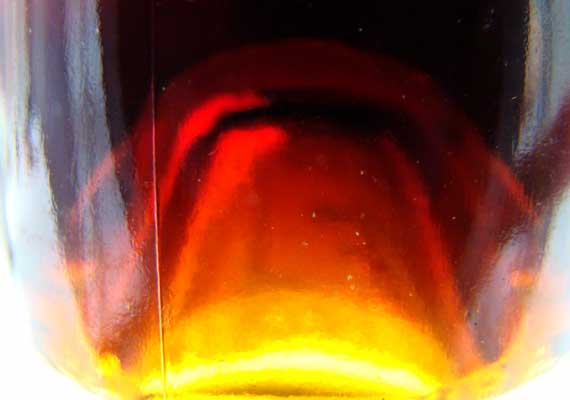Musings

Grain is the closest thing to an industrial commodity: storable, portable, fungible, ever the same today as it was yesterday and will be tomorrow. Since it can be accumulated and traded, grain is a form of wealth. It is a weapon, too…; the nations with the biggest surpluses of grain have always exerted power over the ones in short supply. Throughout history governments have encouraged their farmers to grow more than enough grain, to protect against famine, to free up labor for other purposes, to improve the trade balance, and generally to augment their own power. *
Note: wheat prices on the global market have doubled in the last year.
Implications? Yes, the modern global economy pivots on more than food, but food prices, especially of the underpinning of the modern diet—grain, as Pollan repeatedly notes—have substantive implications, including of sociopolitical instablity.
Archaeologically, evidence of food storage takes myriad forms: below-ground pits, pots and baskets and other containers…. Of special interest: where those were located—out in public view or hidden in a domestic structure….
* From Michael Pollan’s The Omnivore’s Dilemma: A Natural History of Four Meals (2006; now available in paperback!), page 201. Read Pollan’s page here, and the NYT review here.
Posted at 10:22 PM |
Comments Off on Grain/fundamentals

Pontil (the indented base) of mold-made (modern) bottle.
Several years ago, we discovered this lovely after-dinner wine, a variety of sherry, as I understand it. The grape is called Pedro Ximénez, and is often referred to simply as PX. The wine has a rich raisin backnote and makes for some fine sipping. Especially when it’s nippy out.
Posted at 5:10 PM |
Comments Off on Fluid: fortified

AP reports that this current year is likely to be the first in which US households spend more, on average, on cell phones than on land lines. [Read the story here, at Wired, or here, at CBS News.]
How much of a push have those expensive iPhones given to this statistic?
Posted at 10:22 PM |
Comments Off on Phone costs

SE of Woodbury GA on Cove Road is an abandoned dish installation, visible on GoogleEarth.
Note on a twisted world: I’ve seen lots of ads for batteries on TV, but I don’t ever remember seeing one for rechargeables.
Is this just “the best of” capitalism?
Speaking of the free market, look at this table of changes in food prices since November 2006. So why is dairy up so much more than even meat? I’m mystified.
Maybe it’s because the meat figures are subsumed into a category with fish and eggs? Or does it have to do with agricultural subsidies skewing things behind the scenes, as it were?
And how is it that apparel prices have dropped? Is this a China/Asia factor?
Posted at 6:36 PM |
Comments Off on Market shifts?

Reaching back several years into the archives, I took this photo in the Northland on this day of the year. RM pointed out the face to me, and I thought the old maple might not survive too much longer, so I committed a digital version to iPhoto’s storage, although the light was rather un-helpful.
You do see the face, right?
Posted at 6:34 PM |
1 Comment »

So many topics today!
Number One has to be the machine above! Cool on every front! More later, I’m sure, as we find the time to dig around in its innards—which are quite transparent! My short take on the OLPC machine (yours for a small donation—really!) is that now I see why Bill Gates has so much money! If this is all it costs to have a machine and have software unburdened by huge royalties, then I’m more than ready to move on. This machine is not a toy, it’s a tool, more powerful than many machines, and more portable, durable, better at just about anything you can name. Record music. Do a calculation. RSS. IM/Chatting. Share composition of a document. Powerful!
And, remember, you’ve gotten 2-two-dos for Four-Twenty-Something (that is, approximately $423, or $200 for each machine, and the remainder to ship yours to you!). Get yours here!
Next: Fun Xmas Party! But private, so I’ll move on, except to say that many people examined and loved the OLPC!
Third: I have true admiration for the statistical concept of average, and the insights it can give, but these figures from the WashPost on the financials of the average household here in the US have little resemblance to that of any I know that I’m staggered. Who do I know that spends $3600 a year on furniture and household equipment? This must mean a staggering number of households are spending oh so much more than my acquaintances do! Consumer credit average: about $21,500. Whew. Don’t think that high figure represents many (any?, no I can think of two…) of our friends, but spread across the nation with an average income of a smidge over $55K, not hard to see why we’re hearing so much about the credit crunch/squeeze/Problem!
Four: Big snow in Lower Michigan. Sorry, Kids, since it’s Sunday, no Snow Day from school.
Posted at 10:22 PM |
3 Comments »

Okay, the warm summery days are gone gone gone, and the rains have arrived. Maybe we’ll have a fairly normal winter from here out—with a semi-rainy season. Last winter we never had the rains, which is part of why our drinking water supplies are so low.
I think people don’t take this water situation seriously. I’m not overhearing people talk about it while walking on the street or shopping in stores and the like, but maybe I’m too much of a hermit to have an accurate radar on this.
So, to avoid water consumption, I’ve been upping my beer consumption (serious duty, here!), and this is a lovely bottle we had from our good friend “Mugs,” who has an importing system for Western brews. I can’t give details here, because I don’t want to compromise it/him.
So, to make a long story short, via Mugs we acquired this fine bottle, and, yes, the name is Moose Drool Brown Ale. I found the beer’s flavor superior to what the name suggests (at least to me!).
Posted at 4:49 PM |
3 Comments »

According to the meteorologists, today we saw the last of these much-higher-than-average temperatures….
Posted at 10:22 PM |
Comments Off on Weather shift?

Okay, gotta return to that big scale, long time span perspective in pondering this piece by Alan Greenspan in the WSJ on our current mortgage/banking crisis. I certainly don’t know enough about modern history to theorize about this subject, so a critical look at Greenspan’s ideas seems, well, wise.
Key idea: post-WWII expansion-of-exports model of national economic growth in third-world countries, with the developed world being the buyers. Or, from the developed world perspective: exporting jobs (Greenspan doesn’t say this here) and depressing labor compensation rates (Greenspan does say this; I’d use the term “wages”).
Greenspan’s next point: what people in developing countries did with their increased income—they decreased investment, I suspect (G doesn’t say this) because they were buying more stuff = goods (= clutter in Anne-speak) with their expanded income.
This, he says, brought down global long-term interest rates, and the reason we should worry about this is, um, I think, when the price of risk surges…well, you can tell I’m lost….
Still, I’m glad I tried to sort it out….
Posted at 9:47 PM |
2 Comments »

If…*
You’d think that by now biologists agree on what a gene is and have moved on.
Apparently not.
And the reason is both historical and scalar.
It’s historical in that the term was originally used in biology and genetics in a particular way that made sense at the time. Then, as research continued, scientists uncovered additional complexity in the role of genes and genetics. In addition, they began to look at genes from new scales and perspectives.
Thus, while a geneticist tends to still see genes as locatable regions of genomic sequences, those who delve into phenotypes and function tend to find that an insufficient definition. For example, DNA, that old workhorse considered the master molecule of life, is now seen to be sometimes quite passive (meaning other factors can act or dominate), and just plain multifunctional in ways that weren’t known when the locatable regions concept was developed.
If you want to read more (I’m not being sarcastic!), check out this 2007 paper by Evelyn Fox Keller and David Harel in PLoS ONE, one of the free, on-line Public Library of Science journals (hence: “PLoS”).
My take on this: see, scale makes all the difference (sorry to flog this idea, but, as I’m sure you’ve discerned, this is one of my truths).
Corollary: it may be difficult to match your language and concepts to the scale of analysis. If you’re using the words already in use, they may no longer suffice if defined in old ways. On the other hand, if you introduce new vocabulary, you may introduce layers of confusion. Still, the latter may well be the best choice.
Philosophical question: does this topic link somehow to my current “off-duty” reading that has settings in China, Tibet, and Turkey?—three different volumes….
Keller, Evelyn Fox, and David Harel (2007) Beyond the Gene. PLoS ONE 2(11): e1231. doi:10.1371/journal.pone.0001231 [Apologies to AFK if she’d prefer to be “Fox Keller, Evelyn”; I see both in the Google-able world.]
Sidebar: I see pink champagne, rechristened rosé champagne of course, is très chic, but I remain a prosecco gal! (Especially at those prices!)
Okay, one more. How could I not link to this, on a huge ice skating rink in Mexico City’s main plaza, created atop forty-six miles of chilling tubes, energized by ten truck-generators? Did they make the rink because the US border is harder to cross these days?—so they import the cold?
* If your eyes are sharp and your screen is good, you’ll see ice—the picture is from several years back, but right here in good ol’ ATL….
Today’s vocabulary—peripeteia
the sudden reversal of fortune or change in circumstances, often used referring to fictional narrative.
Posted at 7:16 PM |
1 Comment »









